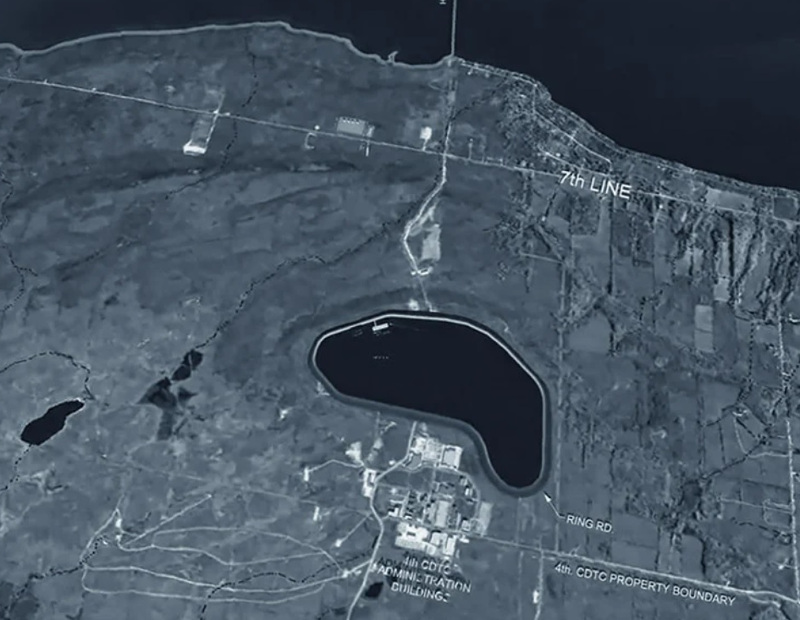Meaford council has approved a motion brought forward during their November 3 meeting by Deputy Mayor Shirley Keaveney seeking baseline water testing from properties in close proximity to the 4th Canadian Division Training Centre land where TC Energy is proposing to develop a hydro-electric pumped storage facility.
The Deputy Mayor’s motion was the result of a recommendation by the Pumped Storage Advisory Committee (PSAC) in April of this year. The PSAC motion requests a third party water testing program independent from TC Energy. The PSAC motion was first discussed at council in June, when council gave direction for staff to seek comment from TC Energy about the resolution.
The motion brought forward on November 10 by the Deputy Mayor directs municipal staff to engage a consulting firm to undertake “baseline water sampling and testing for carcinogens, heavy metals and toxins, including but not limited to: PFAS, dioxins, furan, etc. as recommended in the PSAC motion, from specific locations in proximity to the proposed site of the OPS project no later than Q2 of 2026.”
The motion als0 gives direction to staff to provide the results of the testing to council and PSAC.
Though it is not yet known what a water testing program will cost, the motion directs staff to include the cost in the 2026 operating budget.
Councillor Rob Uhrig asked if the cost of the testing should be recovered from TC Energy.
CAO Shawn Everitt told council that the municipality would seek cost recovery.
“Efforts would be made. We have a very good, clean process now of where we are requesting funds. An actual request goes to TC Energy prior to any funds being expended, as this is one that we would be making that request and look to hear back from TC Energy whether or not it would fit their criteria,” Everitt told council.
Deputy Mayor Shirely Keaveney noted that the pumped storage advisory committee had recommended that TC Energy not be involved with funding the water testing.
“It was the discussion at PSAC that this be funded by the municipality because PSAC wants this to be fully separate from TC Energy, they want TC Energy to have no influence over this testing,” Keaveney told council. “Now if the project is all said and done, and then we can submit an invoice, I just want to be cautious with this because I don’t want any interference, or any attempt to influence, or any control from TC Energy in this particular testing.”
The CAO reminded council that cost recovery does not mean allowing control or influence by TC Energy.
“Just to be clear, I think this is important for the public to understand as well, where the municipality is doing work, even if it is TC Energy-related, the work that would be completed would be under our control, it would be our consultant, so even if TC Energy was to do a cost recovery agreement with us, it in no way, shape, or form has TC Energy supplying or retaining the services of the consultant. That is the municipality’s contract, and in no way be influenced by TC Energy,” Everitt told council.
Uhrig said that he doesn’t want to see Meaford ratepayers foot the bill for the testing, and he proposed an amendment to the resolution to seek cost recovery from TC Energy, while also ensuring that there would be no input or influence by TC Energy regarding the project including the selection of consultant, or scope of testing.
CAO Everitt suggested that the municipality should be looking to the federal government to help fund the testing given that the land in question is federally owned and is used by the DND as a military training base.
Uhrig revised his amendment to seek cost recovery from TC Energy and the federal government. The amendment was supported unanimously by council, which then voted unanimously in favour of the amended motion.
Since the proposed facility first became public knowledge in 2019, local advocacy group Save Georgian Bay has been raising awareness locally, and expressing opposition to the proposal. The group has held a number of protest rallies and has collected thousands of signatures on petitions opposing the proposed facility.
The concerns of Save Georgian Bay and other opponents are many, ranging from fears that the facility would have negative impacts on the environment, including negatively impacting fish in the bay, to concerns that homeowners in close proximity to the site could be in danger of flooding should the reservoir fail. Many have also expressed concern about the cost of the multi-billion dollar proposal, and whether pumped storage should be favoured over battery storage. Save Georgian Bay has said that their work over the past six years has highlighted roughly 30 federally protected species at risk on the project’s proposed site. The group has also expressed concern about the potential contamination of the DND land that could find its way into residential drinking water during the construction of the facility.
TC Energy, on the other hand, has said the proposal is a green initiative that would consume inexpensive off-peak power at night to pump water from Georgian Bay into a 374-acre storage reservoir located 150 metres above the Georgian Bay shoreline on the military base. The reservoir, which would hold 20 million cubic metres of water, would be emptied back into Georgian Bay during peak usage periods, driving hydraulic turbines to generate electricity.
In a media release issued on November 6, Save Georgian Bay highlighted a resolution passed by Tiny Township on October 29, calling for “comprehensive independent studies of TC Energy’s proposed pumped storage project.”
“Tiny Township Council unanimously passed a resolution calling for comprehensive independent studies of TC Energy’s proposed pumped storage project in Meaford and demanding full regional engagement before any approvals are considered. Council expressed concern that the province has narrowly defined Meaford as the sole “host community,” despite the fact that this megaproject will impact all Georgian Bay municipalities. Tiny Township insists that every community around the Bay must have a say in decisions of this magnitude,” informed the Save Georgian Bay media release.
Save Georgian Bay noted that the Tiny Township resolution “will be forwarded to all Georgian Bay municipalities, provincial ministries, Indigenous partners, and federal agencies, urging cooperation to prevent this project from moving forward.”
Tom Buck of the Save Georgian Bay Association congratulated Tiny Township Council for “taking action to protect its residents and the many communities living around Georgian Bay.”
“There are now six municipalities around the Bay that have raised concerns about the adverse impact of this project to the environment, water quality, and utility costs to ratepayers. Momentum opposed to this terrible project is building. People do not like what it would do to the Georgian Bay environment when there are better alternatives for energy storage. The province should stop the project before irrevocable harm is done. More information is available at SaveGeorgianBay.ca,” said Buck.












